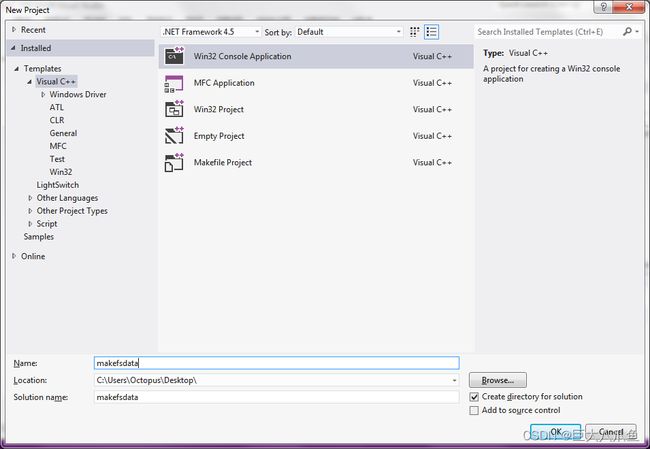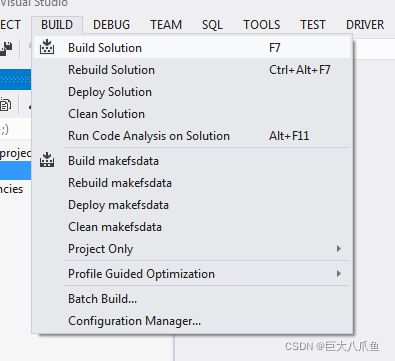在Visual Studio 2012下编译lwip-2.1.3 httpd的makefsdata
步骤一 建立空白工程
新建一个工程,项目名称起名为makefsdata。
因为mkfsdata是一个控制台程序,所以我们要选择Win32 Console Application。
这里很重要,必须要勾选“Empty Project”选项,建立空项目:
建好的解决方案目录是C:\Users\Octopus\Desktop\makefsdata,工程目录是C:\Users\Octopus\Desktop\makefsdata\makefsdata。
步骤二 解压lwip-2.1.3的部分头文件和源文件
去官网下载lwip-2.1.3.zip,解压下列文件到工程目录。
lwip-2.1.3.zip\lwip-2.1.3\src\include ---> 工程目录\lwip-2.1.3\include(解压整个文件夹,以及所有文件)
lwip-2.1.3.zip\lwip-2.1.3\src\core\def.c ---> 工程目录\lwip-2.1.3\core\def.c
lwip-2.1.3.zip\lwip-2.1.3\src\core\inet_chksum.c ---> 工程目录\lwip-2.1.3\core\inet_chksum.c
lwip-2.1.3.zip\lwip-2.1.3\src\apps\http\mkfsdata ---> 工程目录\lwip-2.1.3\apps\http\mkfsdata(整个文件夹)
lwip-2.1.3.zip\lwip-2.1.3\src\apps\http\httpd_structs.h ---> 工程目录\lwip-2.1.3\apps\http\httpd_structs.h
步骤三 建立配置文件
建立“工程目录\lwip-2.1.3\include\arch\cc.h”,内容如下:
这里涉及到一个很重要的知识点:如何在Visual Studio下定义__packed关键字。
#ifndef LWIP_ARCH_CC_H
#define LWIP_ARCH_CC_H
#define LWIP_RAND() ((u32_t)rand())
#define PACK_STRUCT_BEGIN __pragma(pack(push, 1))
#define PACK_STRUCT_END __pragma(pack(pop))
#pragma warning(disable:4996) // 允许使用strcpy等不带_s后缀的函数
#define snprintf _snprintf
#endif
建立“工程目录\lwip-2.1.3\include\lwipopts.h”,内容如下:
#ifndef LWIP_LWIPOPTS_H
#define LWIP_LWIPOPTS_H
#define NO_SYS 1 // 无操作系统
#define SYS_LIGHTWEIGHT_PROT 0 // 不进行临界区保护
#define LWIP_NETCONN 0
#define LWIP_SOCKET 0
#define MEM_ALIGNMENT 4 // STM32单片机是32位的单片机, 因此是4字节对齐的
#define MEM_SIZE 10240 // lwip的mem_malloc函数使用的堆内存的大小
// 配置TCP
#define TCP_MSS 1500
#define LWIP_TCP_SACK_OUT 1 // 允许选择性确认
// 配置DHCP
#define LWIP_DHCP 1
#define LWIP_NETIF_HOSTNAME 1
// 配置DNS
#define LWIP_DNS 1
// 广播包过滤器
// 如果打开了这个过滤器, 那么就需要在套接字上设置SOF_BROADCAST选项才能收发广播数据包
//#define IP_SOF_BROADCAST 1
//#define IP_SOF_BROADCAST_RECV 1
// 配置IPv6
#define LWIP_IPV6 1
#define LWIP_ND6_RDNSS_MAX_DNS_SERVERS LWIP_DNS // 允许SLAAC获取DNS服务器的地址
#endif
建立“工程目录\lwip-2.1.3\include\inttypes.h”,内容如下:
(该文件出处为http://msinttypes.googlecode.com/files/msinttypes-r26.zip)
// ISO C9x compliant inttypes.h for Microsoft Visual Studio
// Based on ISO/IEC 9899:TC2 Committee draft (May 6, 2005) WG14/N1124
//
// Copyright (c) 2006 Alexander Chemeris
//
// Redistribution and use in source and binary forms, with or without
// modification, are permitted provided that the following conditions are met:
//
// 1. Redistributions of source code must retain the above copyright notice,
// this list of conditions and the following disclaimer.
//
// 2. Redistributions in binary form must reproduce the above copyright
// notice, this list of conditions and the following disclaimer in the
// documentation and/or other materials provided with the distribution.
//
// 3. The name of the author may be used to endorse or promote products
// derived from this software without specific prior written permission.
//
// THIS SOFTWARE IS PROVIDED BY THE AUTHOR ``AS IS'' AND ANY EXPRESS OR IMPLIED
// WARRANTIES, INCLUDING, BUT NOT LIMITED TO, THE IMPLIED WARRANTIES OF
// MERCHANTABILITY AND FITNESS FOR A PARTICULAR PURPOSE ARE DISCLAIMED. IN NO
// EVENT SHALL THE AUTHOR BE LIABLE FOR ANY DIRECT, INDIRECT, INCIDENTAL,
// SPECIAL, EXEMPLARY, OR CONSEQUENTIAL DAMAGES (INCLUDING, BUT NOT LIMITED TO,
// PROCUREMENT OF SUBSTITUTE GOODS OR SERVICES; LOSS OF USE, DATA, OR PROFITS;
// OR BUSINESS INTERRUPTION) HOWEVER CAUSED AND ON ANY THEORY OF LIABILITY,
// WHETHER IN CONTRACT, STRICT LIABILITY, OR TORT (INCLUDING NEGLIGENCE OR
// OTHERWISE) ARISING IN ANY WAY OUT OF THE USE OF THIS SOFTWARE, EVEN IF
// ADVISED OF THE POSSIBILITY OF SUCH DAMAGE.
//
///
#ifndef _MSC_VER // [
#error "Use this header only with Microsoft Visual C++ compilers!"
#endif // _MSC_VER ]
#ifndef _MSC_INTTYPES_H_ // [
#define _MSC_INTTYPES_H_
#if _MSC_VER > 1000
#pragma once
#endif
#include "stdint.h"
// 7.8 Format conversion of integer types
typedef struct {
intmax_t quot;
intmax_t rem;
} imaxdiv_t;
// 7.8.1 Macros for format specifiers
#if !defined(__cplusplus) || defined(__STDC_FORMAT_MACROS) // [ See footnote 185 at page 198
// The fprintf macros for signed integers are:
#define PRId8 "d"
#define PRIi8 "i"
#define PRIdLEAST8 "d"
#define PRIiLEAST8 "i"
#define PRIdFAST8 "d"
#define PRIiFAST8 "i"
#define PRId16 "hd"
#define PRIi16 "hi"
#define PRIdLEAST16 "hd"
#define PRIiLEAST16 "hi"
#define PRIdFAST16 "hd"
#define PRIiFAST16 "hi"
#define PRId32 "I32d"
#define PRIi32 "I32i"
#define PRIdLEAST32 "I32d"
#define PRIiLEAST32 "I32i"
#define PRIdFAST32 "I32d"
#define PRIiFAST32 "I32i"
#define PRId64 "I64d"
#define PRIi64 "I64i"
#define PRIdLEAST64 "I64d"
#define PRIiLEAST64 "I64i"
#define PRIdFAST64 "I64d"
#define PRIiFAST64 "I64i"
#define PRIdMAX "I64d"
#define PRIiMAX "I64i"
#define PRIdPTR "Id"
#define PRIiPTR "Ii"
// The fprintf macros for unsigned integers are:
#define PRIo8 "o"
#define PRIu8 "u"
#define PRIx8 "x"
#define PRIX8 "X"
#define PRIoLEAST8 "o"
#define PRIuLEAST8 "u"
#define PRIxLEAST8 "x"
#define PRIXLEAST8 "X"
#define PRIoFAST8 "o"
#define PRIuFAST8 "u"
#define PRIxFAST8 "x"
#define PRIXFAST8 "X"
#define PRIo16 "ho"
#define PRIu16 "hu"
#define PRIx16 "hx"
#define PRIX16 "hX"
#define PRIoLEAST16 "ho"
#define PRIuLEAST16 "hu"
#define PRIxLEAST16 "hx"
#define PRIXLEAST16 "hX"
#define PRIoFAST16 "ho"
#define PRIuFAST16 "hu"
#define PRIxFAST16 "hx"
#define PRIXFAST16 "hX"
#define PRIo32 "I32o"
#define PRIu32 "I32u"
#define PRIx32 "I32x"
#define PRIX32 "I32X"
#define PRIoLEAST32 "I32o"
#define PRIuLEAST32 "I32u"
#define PRIxLEAST32 "I32x"
#define PRIXLEAST32 "I32X"
#define PRIoFAST32 "I32o"
#define PRIuFAST32 "I32u"
#define PRIxFAST32 "I32x"
#define PRIXFAST32 "I32X"
#define PRIo64 "I64o"
#define PRIu64 "I64u"
#define PRIx64 "I64x"
#define PRIX64 "I64X"
#define PRIoLEAST64 "I64o"
#define PRIuLEAST64 "I64u"
#define PRIxLEAST64 "I64x"
#define PRIXLEAST64 "I64X"
#define PRIoFAST64 "I64o"
#define PRIuFAST64 "I64u"
#define PRIxFAST64 "I64x"
#define PRIXFAST64 "I64X"
#define PRIoMAX "I64o"
#define PRIuMAX "I64u"
#define PRIxMAX "I64x"
#define PRIXMAX "I64X"
#define PRIoPTR "Io"
#define PRIuPTR "Iu"
#define PRIxPTR "Ix"
#define PRIXPTR "IX"
// The fscanf macros for signed integers are:
#define SCNd8 "d"
#define SCNi8 "i"
#define SCNdLEAST8 "d"
#define SCNiLEAST8 "i"
#define SCNdFAST8 "d"
#define SCNiFAST8 "i"
#define SCNd16 "hd"
#define SCNi16 "hi"
#define SCNdLEAST16 "hd"
#define SCNiLEAST16 "hi"
#define SCNdFAST16 "hd"
#define SCNiFAST16 "hi"
#define SCNd32 "ld"
#define SCNi32 "li"
#define SCNdLEAST32 "ld"
#define SCNiLEAST32 "li"
#define SCNdFAST32 "ld"
#define SCNiFAST32 "li"
#define SCNd64 "I64d"
#define SCNi64 "I64i"
#define SCNdLEAST64 "I64d"
#define SCNiLEAST64 "I64i"
#define SCNdFAST64 "I64d"
#define SCNiFAST64 "I64i"
#define SCNdMAX "I64d"
#define SCNiMAX "I64i"
#ifdef _WIN64 // [
# define SCNdPTR "I64d"
# define SCNiPTR "I64i"
#else // _WIN64 ][
# define SCNdPTR "ld"
# define SCNiPTR "li"
#endif // _WIN64 ]
// The fscanf macros for unsigned integers are:
#define SCNo8 "o"
#define SCNu8 "u"
#define SCNx8 "x"
#define SCNX8 "X"
#define SCNoLEAST8 "o"
#define SCNuLEAST8 "u"
#define SCNxLEAST8 "x"
#define SCNXLEAST8 "X"
#define SCNoFAST8 "o"
#define SCNuFAST8 "u"
#define SCNxFAST8 "x"
#define SCNXFAST8 "X"
#define SCNo16 "ho"
#define SCNu16 "hu"
#define SCNx16 "hx"
#define SCNX16 "hX"
#define SCNoLEAST16 "ho"
#define SCNuLEAST16 "hu"
#define SCNxLEAST16 "hx"
#define SCNXLEAST16 "hX"
#define SCNoFAST16 "ho"
#define SCNuFAST16 "hu"
#define SCNxFAST16 "hx"
#define SCNXFAST16 "hX"
#define SCNo32 "lo"
#define SCNu32 "lu"
#define SCNx32 "lx"
#define SCNX32 "lX"
#define SCNoLEAST32 "lo"
#define SCNuLEAST32 "lu"
#define SCNxLEAST32 "lx"
#define SCNXLEAST32 "lX"
#define SCNoFAST32 "lo"
#define SCNuFAST32 "lu"
#define SCNxFAST32 "lx"
#define SCNXFAST32 "lX"
#define SCNo64 "I64o"
#define SCNu64 "I64u"
#define SCNx64 "I64x"
#define SCNX64 "I64X"
#define SCNoLEAST64 "I64o"
#define SCNuLEAST64 "I64u"
#define SCNxLEAST64 "I64x"
#define SCNXLEAST64 "I64X"
#define SCNoFAST64 "I64o"
#define SCNuFAST64 "I64u"
#define SCNxFAST64 "I64x"
#define SCNXFAST64 "I64X"
#define SCNoMAX "I64o"
#define SCNuMAX "I64u"
#define SCNxMAX "I64x"
#define SCNXMAX "I64X"
#ifdef _WIN64 // [
# define SCNoPTR "I64o"
# define SCNuPTR "I64u"
# define SCNxPTR "I64x"
# define SCNXPTR "I64X"
#else // _WIN64 ][
# define SCNoPTR "lo"
# define SCNuPTR "lu"
# define SCNxPTR "lx"
# define SCNXPTR "lX"
#endif // _WIN64 ]
#endif // __STDC_FORMAT_MACROS ]
// 7.8.2 Functions for greatest-width integer types
// 7.8.2.1 The imaxabs function
#define imaxabs _abs64
// 7.8.2.2 The imaxdiv function
// This is modified version of div() function from Microsoft's div.c found
// in %MSVC.NET%\crt\src\div.c
#ifdef STATIC_IMAXDIV // [
static
#else // STATIC_IMAXDIV ][
_inline
#endif // STATIC_IMAXDIV ]
imaxdiv_t __cdecl imaxdiv(intmax_t numer, intmax_t denom)
{
imaxdiv_t result;
result.quot = numer / denom;
result.rem = numer % denom;
if (numer < 0 && result.rem > 0) {
// did division wrong; must fix up
++result.quot;
result.rem -= denom;
}
return result;
}
// 7.8.2.3 The strtoimax and strtoumax functions
#define strtoimax _strtoi64
#define strtoumax _strtoui64
// 7.8.2.4 The wcstoimax and wcstoumax functions
#define wcstoimax _wcstoi64
#define wcstoumax _wcstoui64
#endif // _MSC_INTTYPES_H_ ]
步骤四 将文件添加到Visual Studio 2012工程中
工程中只添加mkfsdata.c文件,其余的文件一律不添加。
步骤五 编译生成32位Release版程序
要求:生成的程序能够在刚安装好的纯净版Windows XP系统上直接运行,不需要安装任何运行时库。
首先切换到Release模式:
打开项目属性:
选择Visual Studio 2012 - Windows XP (v110_xp)模式:
添加lwip-2.1.3的头文件路径:
选择多线程模式(/MT),不依赖于任何Runtime库的DLL。
编译程序:
1>------ Build started: Project: makefsdata, Configuration: Release Win32 ------
1> makefsdata.c
1> Generating code
1> Finished generating code
1> makefsdata.vcxproj -> C:\Users\Octopus\Desktop\makefsdata\Release\makefsdata.exe
========== Build: 1 succeeded, 0 failed, 0 up-to-date, 0 skipped ==========
程序就编译出来了。把这个程序放到单片机lwip工程的apps/http文件夹下就可以用了。
程序的功能是把fs文件夹下的所有网页和图片文件,整合成一个fsdata.c文件。











